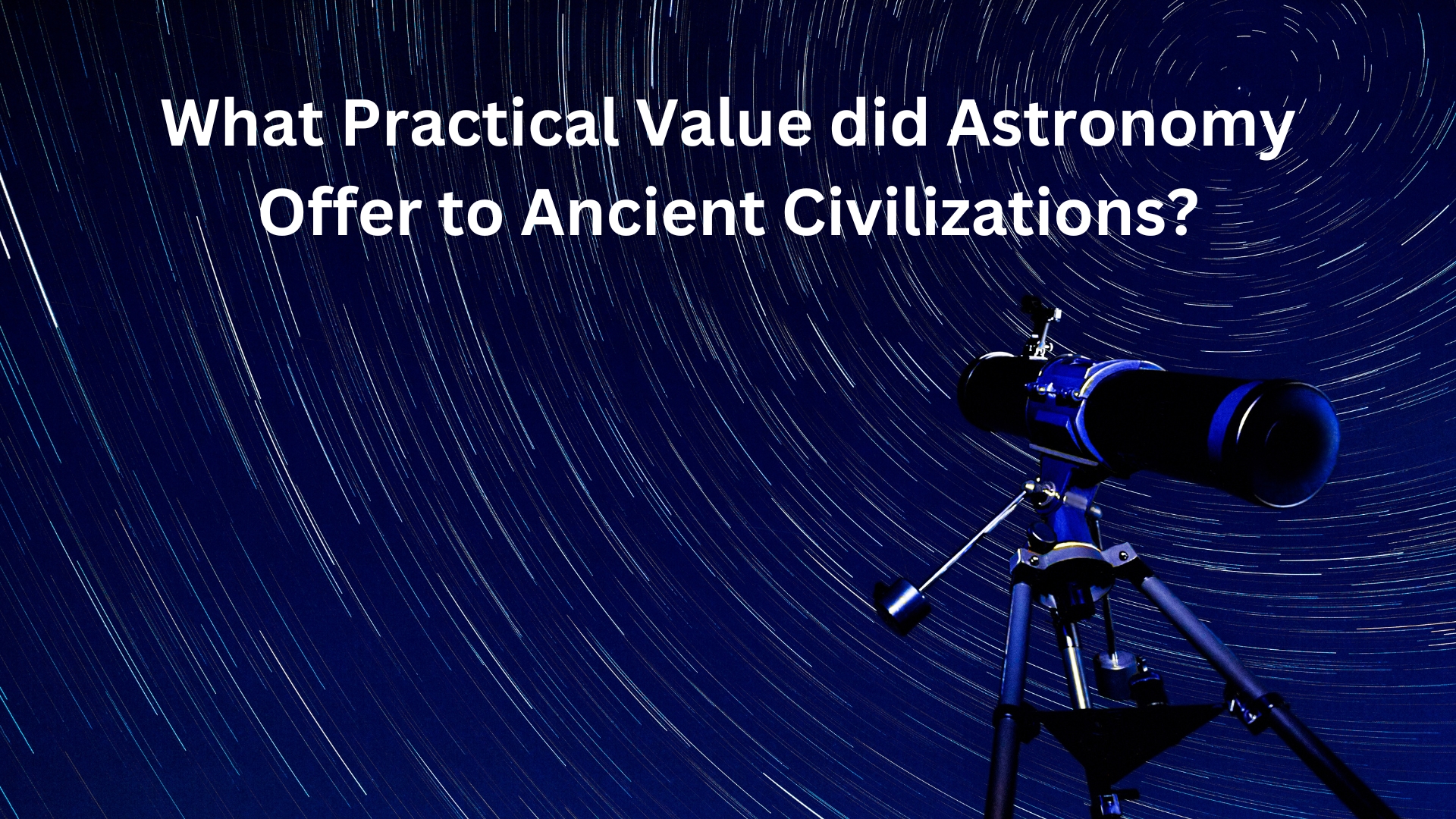What Practical Value did Astronomy Offer to Ancient Civilizations?
Astronomy has had a significant practical value for ancient civilizations for many centuries. From tracking the passage of time and helping with navigation, to making predictions about future events and contributing to the development of cosmological theories, astronomy has played a vital role in the daily lives and cultures of these civilizations. This topic is worth discussing because it highlights the important contributions that astronomy has made to human society, and it helps us to understand the ways in which people in the past used their understanding of the universe to improve their lives.
Additionally, understanding the practical value of astronomy to ancient civilizations can give us insight into the ways in which our own society might be able to benefit from a deeper understanding of the universe.
[lwptoc]
Astronomy has had a number of practical uses for ancient civilizations. For example:
- Timekeeping: The movement of celestial bodies, such as the sun and moon, can be used to track the passage of time. This is especially useful for agriculture, as it allows people to know when to plant and harvest crops.
- Navigation: The position of celestial bodies can be used to determine direction and location. This is especially useful for seafarers, who can use the position of the stars and the sun to navigate across the open ocean.
- Calendar: The cycles of celestial bodies can be used to create a calendar. This is important for religious and cultural events, as well as for organizing the daily lives of people.
- Prediction: By studying the movements of celestial bodies, astronomers can make predictions about future events, such as eclipses and the appearance of comets. This can be useful for predicting natural disasters and other events that might have an impact on people’s lives.
- Cosmology: Astronomy has also played a role in the development of cosmological theories, which are used to explain the origin and evolution of the universe. These theories have had a major impact on the way that people think about the world and their place in it.
1. Timekeeping
In ancient civilizations, the movement of celestial bodies was used to track the passage of time. For example, the movement of the sun across the sky was used to mark the passage of days, while the phases of the moon were used to mark the passage of months. This was especially useful for agriculture, as it allowed people to know when to plant and harvest crops. Tracking the passage of time was also important for other aspects of daily life. For example, it allowed people to know when to hold religious and cultural events, and it helped with the organization of daily activities. Overall, the ability to track the passage of time using celestial bodies was essential for the daily lives of people in ancient civilizations, and it continues to be important for many aspects of modern life as well.
2. Navigation
The position of celestial bodies was used for navigation in ancient times. For example, seafarers could use the position of the sun and stars to determine their location and direction at sea. The North Star, for example, was used to determine the direction of north, which could be used as a reference point for navigation. This was especially important for ancient seafarers, as they did not have access to the sophisticated navigational tools that are available today.
By using celestial bodies to navigate, they were able to travel long distances across the open ocean and reach destinations that would have been otherwise difficult to find. Overall, the use of celestial bodies for navigation was essential for ancient travelers, and it continues to be an important aspect of navigation today, even with the use of modern navigational tools.
3. Calendar
The cycles of celestial bodies, such as the sun and moon, were used to create calendars in ancient civilizations. These calendars helped to organize daily life and mark important cultural and religious events. For example, the cycle of the sun was used to mark the passage of the year, and the phases of the moon were used to mark the passage of the month. This allowed people to plan their daily activities and mark important events on the calendar. Calendars were also important for cultural and religious events.
Many ancient civilizations had mythologies and beliefs that were tied to celestial events, such as eclipses and comets. By tracking these events on a calendar, people were able to plan and celebrate these events in a way that was meaningful to their culture. Overall, the creation of calendars using celestial bodies was an important aspect of ancient civilizations, and it continues to be an important part of modern life as well.
4. Prediction
Astronomers in ancient civilizations used their knowledge of celestial bodies to make predictions about future events. For example, by studying the movements of the sun, moon, and planets, they were able to predict eclipses and the appearance of comets. These predictions were useful for a number of practical purposes. For example, eclipses were often seen as portents of disaster or change, and people would take precautions in anticipation of an eclipse. Similarly, the appearance of a comet was often seen as a sign of significant events, such as the death of a ruler or the outbreak of war.
In addition to predicting cultural and societal events, astronomers in ancient civilizations also used their knowledge of celestial bodies to predict natural disasters. For example, they could use their understanding of the movements of celestial bodies to predict the onset of storms or the occurrence of earthquakes. Overall, the ability to make predictions about future events using celestial bodies was an important practical value of astronomy to ancient civilizations, as it allowed people to be better prepared for significant events that might have an impact on their lives.
5. Cosmology
Astronomy played a significant role in the development of cosmological theories in ancient civilizations. These theories were used to explain the origin and evolution of the universe, and they had a major impact on the way that people thought about the world and their place in it. For example, many ancient civilizations had creation myths that involved celestial bodies and events, such as the sun, moon, and stars. These myths were used to explain the origins of the universe and the place of humans within it. In addition to creation myths, ancient astronomers also used their observations of celestial bodies to develop theories about the nature of the universe.
For example, the ancient Greeks developed the concept of the geocentric model, which posited that the Earth was the center of the universe and that the sun, moon, and planets revolved around it. Overall, the development of cosmological theories using astronomical observations was an important aspect of ancient civilizations, and it continues to be a significant area of study today. These theories have had a major impact on the way that people think about the world and their place within it, and they have helped to shape our understanding of the universe.
Conclusion
In conclusion, astronomy has had a significant practical value for ancient civilizations for many centuries. From tracking the passage of time and helping with navigation, to making predictions about future events and contributing to the development of cosmological theories, astronomy has played a vital role in the daily lives and cultures of these civilizations. The use of celestial bodies for timekeeping allowed people to track the passage of time and plan their daily activities and cultural events.
Navigation using celestial bodies was essential for ancient travelers, particularly seafarers, as it allowed them to find their way across the open ocean. The creation of calendars using celestial bodies helped to organize daily life and mark important cultural and religious events. The ability to make predictions about future events using celestial bodies was useful for predicting natural disasters and other events that might have an impact on people’s lives.
Finally, the development of cosmological theories using astronomical observations had a major impact on the way that people thought about the world and their place within it. Overall, the practical value of astronomy to ancient civilizations was significant, and it continues to be an important field of study today.



